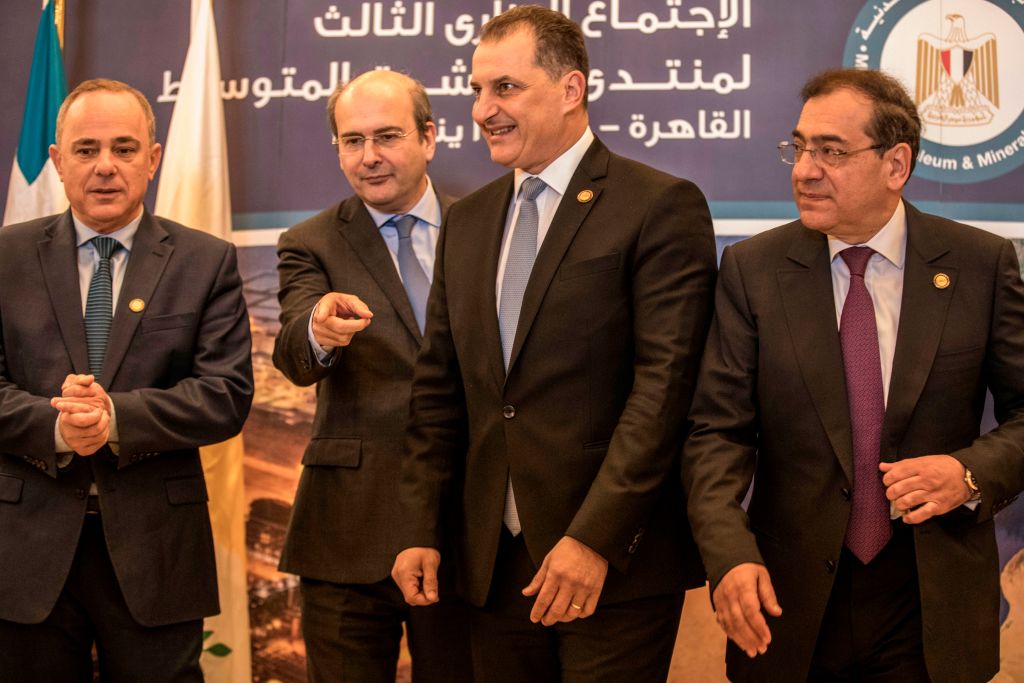Managing a new Middle East order

Across the Middle East, alliances are shifting in unexpected ways. What does the emerging configuration mean for a region that is seemingly eternally walking a thin line between war and peace?
The ongoing shifts are largely driven by Iran’s growing influence. Gulf countries, fearing that the United States, their longtime ally, is unwilling to do enough to stem Iran’s rise, are simultaneously reaching out to Tehran and moving towards deeper security ties with Israel. Meanwhile, the historically close relationship between regional heavyweights Saudi Arabia and the United Arab Emirates is becoming increasingly tense.
But Iran is not the only factor. In the eastern Mediterranean, the discovery of energy reserves in Israeli, Cypriot and Egyptian waters over the past decade has brought together old enemies. Jordan has a 15-year agreement to buy gas from Israel, despite political tensions between the two countries.
Even gas-rich Egypt is purchasing Israeli supplies—a reversal from just a decade ago, when Egypt supplied some 40% of Israel’s gas—in order to boost its profile as an energy-transit hub. (Energy superpowers such as the UAE and Qatar have also acquired stakes in Mediterranean gas fields, in a bid to bypass the Suez Canal.)
Now, an eastern Mediterranean energy community is emerging. The first annual Eastern Mediterranean Gas Forum (EMGF) was held in Cairo in 2019. Last year, that forum became an intergovernmental organisation, with an exceptionally disparate group of members: Cyprus, Egypt, Greece, Israel, Italy, France, Jordan and the Palestinian Authority.
The notion that this will lead to the emergence of a political–economic union in the eastern Mediterranean might seem farfetched. But it wouldn’t be the first time an energy-security alliance gave rise to a regional strategic community: the European Economic Community emerged from the European Coal and Steel Community in the 1950s.
Israel, for one, has good reason to continue to deepen its engagement with partners in the eastern Mediterranean. Already, Greece has offered access to its airspace for Israeli air force training, in exchange for Israeli gas, defence technology and military intelligence. Last April, Greece hosted a multinational exercise, in which UAE aircraft flew alongside Israeli fighters. Israel could achieve a level of strategic depth in the eastern Mediterranean that it never gained in the continental Middle East.
But one country is conspicuously absent from recent efforts to deepen cooperation in the eastern Mediterranean. Turkey has been locked in maritime disputes with Greece practically as long as the two states have existed, and now they are at loggerheads over competing claims to energy reserves in contested waters.
Greece is part of two blocs countering Turkey: one with Cyprus and Egypt, the other with Cyprus and Israel. The latter group agreed in January 2020 to construct an eastern Mediterranean pipeline to channel gas to Europe, thereby reducing the European Union’s energy dependence on Russian supplies. For Turkey, which has long sought to position itself as central to any energy corridor between the eastern Mediterranean and Europe, this is very bad news.
Already, Turkey’s relations with its NATO allies in Europe have deteriorated sharply. Last summer, Turkish ships entered contested waters between the Greek islands of Rhodes and Kastellorizo, prompting Greece to move almost its entire naval fleet to the area, with a French naval contingent also providing support. Only German Chancellor Angela Merkel’s intervention averted a major flare-up.
At this point, Turkey’s bid for EU membership is all but buried. Yet the country has also been frustrated in its efforts to assume a larger strategic role in the Middle East. In 2019, when Turkey signed an accord with Libya’s internationally recognised government, led by Prime Minister Abdul Hamid Dbeibah, to defend Libya’s exclusive economic zone under the Law of the Sea, it was partly seeking to ensure that no EMGF project in the area could exclude it.
More broadly, Libya has become a theater for ideological confrontation, in which Turkey, together with Qatar, favours Dbeibah, an old ally of the Muslim Brotherhood and Salafist groups, and Egypt and the UAE support the Libyan National Army commander, Field Marshal Khalifa Haftar. Russia also fights alongside Haftar’s rebel forces in Libya, as part of a regional strategy that is as much about energy as geopolitics.
Russia has a 30% stake in Egypt’s Zohr offshore gas field, and a 20% stake in a gas-exploration joint venture in Lebanon. It has acquired significant gas concessions from its client regime in Syria as well, and is involved in oil and gas projects in Iraqi Kurdistan. And the TurkStream pipeline, which supplies Turkey, was launched last year.
Russia hopes to keep the EU dependent on its gas and create a new gas corridor to southeastern Europe. But the threat it poses to core Western interests is containable. While Russia is a force to be reckoned with in the eastern Mediterranean, it lacks the economic and military capabilities required to fulfill the role of an uncontested regional hegemon.
Ultimately, the US remains the Middle East’s main military power and an indispensable guarantor of regional stability—despite its Gulf allies’ fears and its withdrawal from Afghanistan. The US, with its NATO allies, is uniquely positioned to push back against anti–status quo powers, from Iran to Turkey to Russia, and ensure freedom of navigation in the eastern Mediterranean.
But direct confrontation would breed only chaos, with potentially catastrophic results. Instead, the US should use its unique position to convince the EMGF, in which it is an observer, to reach a modus vivendi with Turkey, offering it some path to membership and eventually also a stake in exploration and a revenue-sharing deal. In short, the US must display the same kind of balanced diplomacy it has often used to prevent confrontation between its own ‘friend-enemies’ (US allies but enemies among themselves) in East Asia.